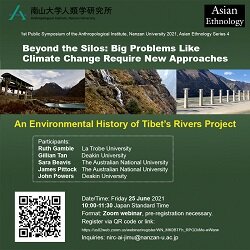研究活動 2021-2025年度
第1回公開シンポジウム "Symposium: Beyond the Silos: Big Problems Like Climate Change Require New Approaches" (Asian Ethnology Series 4)
2021年06月25日

2021年度 第1回公開シンポジウム
"Symposium: Beyond the Silos: Big Problems Like Climate Change Require New Approaches" (Asian Ethnology Series 4)
日 時:2021年6月25日(金)10:00~11:30(発表60分、質疑応答30分)
会 場:Zoom Webinar
主 催:南山大学人類学研究所
講 師:
Ruth Gamble 氏 (La Trobe University)
Gillian Tan 氏 (Deakin University)
Sara Beavis氏 (The Australian National University)
James Pittock 氏 (The Australian National University)
John Powers氏 (Deakin University)
司 会:Benjamin Dorman, 南山大学・教授/人類学研究所 第一種研究員
使用言語:英語
プログラム:
10:00-10:05 Introduction (Benjamin Dorman)
10:05-11:00 Symposium
(Ruth Gamble/ La Trobe University,
Gillian Tan/ Deakin University, Sara Beavis/ The Australian National University,
James Pittock/ The Australian National University, John Powers/ Deakin University)
11:00-11:30 Q&A
(司会:Benjamin Dorman:南山大学・教授/人類学研究所 第一種研究員)
参加登録:
ご参加いただくには事前登録が必要です。ご参加される方は、下記よりお申込みください。
Please register via this link or QR Code,

Abstract:
Academic research has traditionally been conducted within sequestered silos, with each discipline following its own approaches and largely communicating within self-limiting communities. But many of today's biggest problems demand solutions based on data from a range of disciplines, which can be used to find new solutions. This project focuses on the world's most pressing problem, climate change, and it brings together a diverse team of scientists, ethnographers, and historians to develop a picture of the environmental history of Tibet's rivers. Tibet's glaciers are often referred to as the "third pole," along with the ice caps of the North and South Poles. They are the third largest repository of fresh water in the world, and they're shrinking at four times the global rate. This has significant ramifications for billions of people because 85% of Asia's populations depend on rivers that originate in Tibet. Hydrological patterns connected with the Southern Oscillation begin in glaciers in western Tibet, and these determine amounts of rainfall in South and Southeast Asia and Australia, and they also affect the El Niño/La Niña, which determines rainfall across large areas of the globe. Environmental history is uniquely suited to a multidisciplinary approach that uses data from science, history, and ethnography to form comprehensive pictures of the past that can be used as comparators for current situations. Our project is an example of this sort of new approach, one that can lead to results that are both more robust and more expansive than what would be possible for individual researchers working solely within the parameters of their respective disciplines.
【Report】
This Symposium was attended by 21 participants. The video can be seen here:
Podcast episode:
Click below for an Asian Ethnology Podcast episode featuring John Powers discussing this project.
第1回公開シンポジウム "Symposium: Beyond the Silos: Big Problems Like Climate Change Require New Approaches" (Asian Ethnology Series 4)
This symposium brought together scholars of history (Ruth Gamble), anthropology (Gillian Tan), religious studies (John Powers), and scientists (Sara Beavis and James Pittock) who discussed their respective approaches to issues related to developing an environmental history of Tibet's rivers. Most academic projects do not go beyond the boundaries of specific disciplines, yet this project is unique in that it draws together these scholars to form a truly multidisciplinary project. The focus of the project is on Tibet's rivers and the environmental problems that arise from climate change, and the effects of changes on global hydrological patterns, which affect rainfall patterns. John Powers, the project leader, first gave an overview of the project, then each researcher presented a brief description of their work related to the project. This was followed by a lively discussion involving 21 participants. One of the most valuable parts of the discussion was what each researcher felt they learnt from disciplinary approaches they were not familiar with, how these impacted their thinking, and how they might approach their work with these in mind.